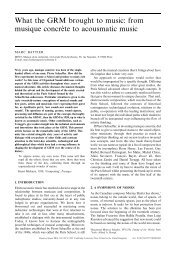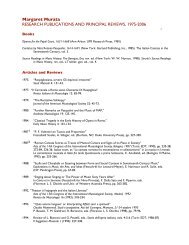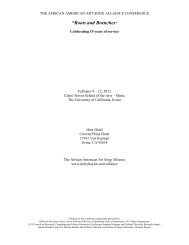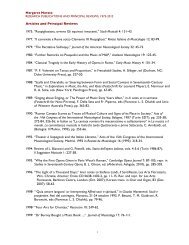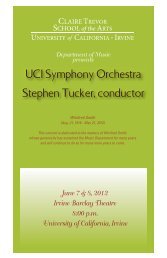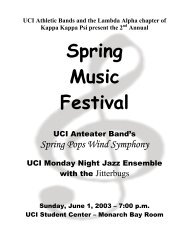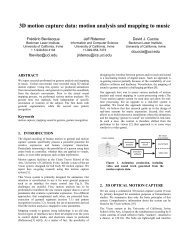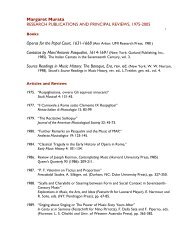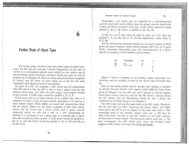amy bauer The Other of the Exotic: Balinese Music as Grammatical ...
amy bauer The Other of the Exotic: Balinese Music as Grammatical ...
amy bauer The Other of the Exotic: Balinese Music as Grammatical ...
You also want an ePaper? Increase the reach of your titles
YUMPU automatically turns print PDFs into web optimized ePapers that Google loves.
<strong>The</strong> <strong>O<strong>the</strong>r</strong> <strong>of</strong> <strong>the</strong> <strong>Exotic</strong> 367<br />
5. For more on this topic, see P<strong>as</strong>ler (1994).<br />
6. Debussy writes <strong>the</strong> following in a letter written on 22 January 1895 to Pierre Louÿs<br />
regarding gamelan performances at <strong>the</strong> Paris Universal Exhibition in 1889: ‘But my<br />
dear good fellow! Remember <strong>the</strong> music <strong>of</strong> Java which contained every nuance, even<br />
<strong>the</strong> ones we no longer have names for. <strong>The</strong>re tonic and dominant had become<br />
empty shadows <strong>of</strong> use only to stupid children’ (Debussy 1987, p. 76). Richard<br />
Mueller (1986) convincingly demonstrates <strong>the</strong> influence on Debussy’s Fantaisie for<br />
piano and orchestra (1890) <strong>of</strong> both <strong>the</strong> Javanese gamelan performance at <strong>the</strong><br />
Exposition Universelle in Paris <strong>of</strong> 1889 and <strong>the</strong> instruments <strong>of</strong> <strong>the</strong> gamelan sent by<br />
<strong>the</strong> Dutch to <strong>the</strong> Paris Conservatoire in 1887. None<strong>the</strong>less, he admits that <strong>the</strong><br />
primary markers <strong>of</strong> this influence – whole-tone and pentatonic scale types and<br />
cyclic <strong>the</strong>mes – appeared much earlier in Debussy’s music.<br />
7. Benjamin Such<strong>of</strong>f identifies several <strong>of</strong> <strong>the</strong>se instances in <strong>the</strong> editor’s preface to<br />
Bartók (1997). See especially pp. xii–xiii and xvi–xvii.<br />
8. <strong>O<strong>the</strong>r</strong> conceptual orientalists are Henry Cowell and Harry Partch, while Colin<br />
McPhee and Lou Harrison are said, along with Hovhaness, to engage in ‘cheap<br />
imitation’ (Corbett 2000, p. 173).<br />
9. As noted by James Pritchett (1993), p. 74.<br />
10. <strong>The</strong> original reads: ‘Gehörte ich vor 30, ja sogar 20 Jahren noch mehr oder weniger<br />
zur Komponistengruppe, die sich als “avantgardistisch” verstand, bindet mich<br />
heute keine Gruppenideologie mehr. Die avantgardistische Protesthandlung war<br />
ein politischer Gestus einer Elite. Mit dem Zusammenbruch der sozialistischen<br />
Utopie und mit der Veränderung der technischen Zivilisation durch die Verbreitung<br />
der Mikroelektronik ist auch die Zeit der Künstlerischen Avantgarde vorbei. Da für<br />
mich die “schöne” Postmoderne als eine Schimäre erscheint, suche ich nach einer<br />
“anderen” Modernität, weder nach einem “Zurück-zu”, noch nach modischem<br />
Protest oder “Kritik”. Sowohl die funktionale Tonalität als auch die Atonalität<br />
wurden abgenutzt, ebenso die gleichmäßige zwölftönige Temperatur. Viele ethnische<br />
Kulturen, in Afrika und, in besonderer Vielfalt, in Südost<strong>as</strong>ien, geben<br />
Beispiele für ganz andere Intonationssysteme: Sowohl die pentatonischen als auch<br />
die heptatonishcen (gleichmäßige als auch ungleichmäßige) Aufteilungsmöglichkeiten<br />
der Oktave – von Thailand bis zum Salomon-Archipel – bergen unzählige<br />
Ansatzpunkte für eine neue Art von Tonalität in sich, mit anderen Gesetzmöglichkeiten<br />
als jenen der funktionalen’. Ligeti also remarks upon <strong>the</strong> importance <strong>of</strong> <strong>the</strong><br />
example <strong>of</strong> Java in <strong>the</strong> music <strong>of</strong> Debussy, who ‘utilised Sou<strong>the</strong><strong>as</strong>t Asian influence<br />
not <strong>as</strong> folklorism but <strong>as</strong> a grammatical paradigm shift’ (‘Debussy hat den südost<strong>as</strong>iatischen<br />
Einfluß nicht als Folklorismus verwendet, sonder als gramatikalischen<br />
Paradigmenwechsel’) (Ligeti 1993, p. 29).<br />
11. In <strong>the</strong> same source, Ligeti also suggests that ‘Bartók w<strong>as</strong> incredibly antinationalistic!’,<br />
<strong>as</strong> if to underline <strong>the</strong> purity <strong>of</strong> <strong>the</strong> latter’s approach.<br />
12. On this point see Tenzer (1991), p. 83. According to <strong>the</strong> composer, <strong>the</strong> title w<strong>as</strong><br />
intended to evoke <strong>the</strong> imaginary gamelan music ‘indigenous to a strange island which<br />
is not found on any map’ (‘beheimatet auf einer fremden Insel, die auf keiner<br />
Landkarte zu finden ist’); programme notes to <strong>the</strong> Gütersloher Ligeti Festival<br />
(1990), quoted in Floros (1996), pp. 183–4. Ligeti originally subtitled <strong>the</strong> Étude Les<br />
gongs de l’île Kondortombol after this fabled location; see Steinitz (2003), pp. 299–300.<br />
<strong>Music</strong> Analysis, 27/ii-iii (2008)<br />
© 2009 <strong>The</strong> Author.<br />
Journal compilation © 2009 Blackwell Publishing Ltd.



